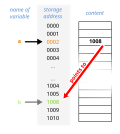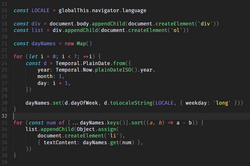In computer programming, a function (also procedure, method, subroutine, routine, or subprogram) is a callable unit of software logic that has a well-defined...
54 KB (6,608 words) - 01:03, 17 July 2025
In computer programming, an anonymous function (function literal, expression or block) is a function definition that is not bound to an identifier. Anonymous...
30 KB (2,277 words) - 05:24, 14 July 2025
a concept of object-oriented programming Function (computer programming), a callable sequence of instructions Function (music), a relationship of a chord...
2 KB (216 words) - 22:45, 4 March 2025
In computer science, function-level programming refers to one of the two contrasting programming paradigms identified by John Backus in his work on programs...
7 KB (826 words) - 08:58, 24 June 2025
In computer programming, a callback is a function that is stored as data (a reference) and designed to be called by another function – often back to the...
17 KB (1,825 words) - 18:14, 1 August 2025
In computer science, functional programming is a programming paradigm where programs are constructed by applying and composing functions. It is a declarative...
88 KB (8,682 words) - 09:41, 29 July 2025
In computer programming, a trait is a language concept that represents a set of methods that can be used to extend the functionality of a class. In object-oriented...
22 KB (2,057 words) - 04:52, 20 June 2025
variables to be among computer science's "most valuable treasures." Donald Knuth, Structured Programming, with go to Statements In computer science, a pointer...
72 KB (9,654 words) - 12:42, 19 July 2025
In computer programming, an operator is a programming language construct that provides functionality that may not be possible to define as a user-defined...
20 KB (1,179 words) - 19:26, 1 August 2025
In computer science, conditionals (that is, conditional statements, conditional expressions and conditional constructs) are programming language constructs...
38 KB (3,947 words) - 04:37, 27 July 2025
In computer science, imperative programming is a programming paradigm of software that uses statements that change a program's state. In much the same...
33 KB (3,629 words) - 12:55, 17 June 2025
In programming languages, a closure, also lexical closure or function closure, is a technique for implementing lexically scoped name binding in a language...
50 KB (6,372 words) - 23:54, 30 July 2025
Data type (redirect from Type (computer programming))
In computer science and computer programming, a data type (or simply type) is a collection or grouping of data values, usually specified by a set of possible...
26 KB (3,407 words) - 09:43, 29 July 2025
programming language for artificial intelligence (AI) research. As one of the earliest programming languages, Lisp pioneered many ideas in computer science...
87 KB (10,027 words) - 08:07, 27 June 2025
Linear programming is a special case of mathematical programming (also known as mathematical optimization). More formally, linear programming is a technique...
61 KB (6,690 words) - 17:57, 6 May 2025
A computer program is a sequence or set of instructions in a programming language for a computer to execute. It is one component of software, which also...
124 KB (13,091 words) - 13:46, 1 August 2025
Kernighan, Programming in C: A Tutorial: main( ) { printf("hello, world"); } In the above example, the main( ) function defines where the program should start...
27 KB (1,948 words) - 16:14, 14 July 2025
In computer programming, an aspect of a program is a feature linked to many other parts of the program, but is not related to the program's primary function...
2 KB (265 words) - 14:03, 30 June 2024
In computer programming, a function object is a construct allowing an object to be invoked or called as if it were an ordinary function, usually with the...
36 KB (4,383 words) - 17:09, 4 May 2025
programming languages, with C compilers available for practically all modern computer architectures and operating systems. The book The C Programming...
98 KB (10,894 words) - 23:38, 28 July 2025
In computer science, function composition is an act or mechanism to combine simple functions to build more complicated ones. Like the usual composition...
19 KB (2,164 words) - 17:25, 20 May 2025
In computer programming, a parameter, a.k.a. formal argument, is a variable that represents an argument, a.k.a. actual argument, a.k.a. actual parameter...
28 KB (3,596 words) - 11:57, 9 May 2025
In computer science, a literal is a textual representation (notation) of a value as it is written in source code. Almost all programming languages have...
4 KB (388 words) - 02:58, 24 July 2024
In computer programming, a declaration is a language construct specifying identifier properties: it declares a word's (identifier's) meaning. Declarations...
8 KB (997 words) - 05:00, 27 August 2024
In computer science, declarative programming is a programming paradigm, a style of building the structure and elements of computer programs, that expresses...
23 KB (2,375 words) - 13:43, 16 July 2025
A wrapper function is a function (another word for a subroutine) in a software library or a computer program whose main purpose is to call a second subroutine...
6 KB (690 words) - 14:44, 3 June 2025
In mathematics and in computer programming, a variadic function is a function of indefinite arity, i.e., one which accepts a variable number of arguments...
29 KB (3,563 words) - 12:16, 25 July 2025
Numbers in the Ch Programming Language". Scientific Programming: 76–106. Cheng, Harry (1993). "Scientific Computing in the Ch Programming Language". Scientific...
12 KB (1,197 words) - 18:55, 8 April 2025
symbols instead of APL symbols. APL (named after the book A Programming Language) is a programming language developed in the 1960s by Kenneth E. Iverson. Its...
96 KB (9,877 words) - 23:32, 9 July 2025
is a fundamental concept in computer science and software engineering, especially within the object-oriented programming paradigm. Examples of this include:...
31 KB (3,944 words) - 07:51, 24 June 2025







